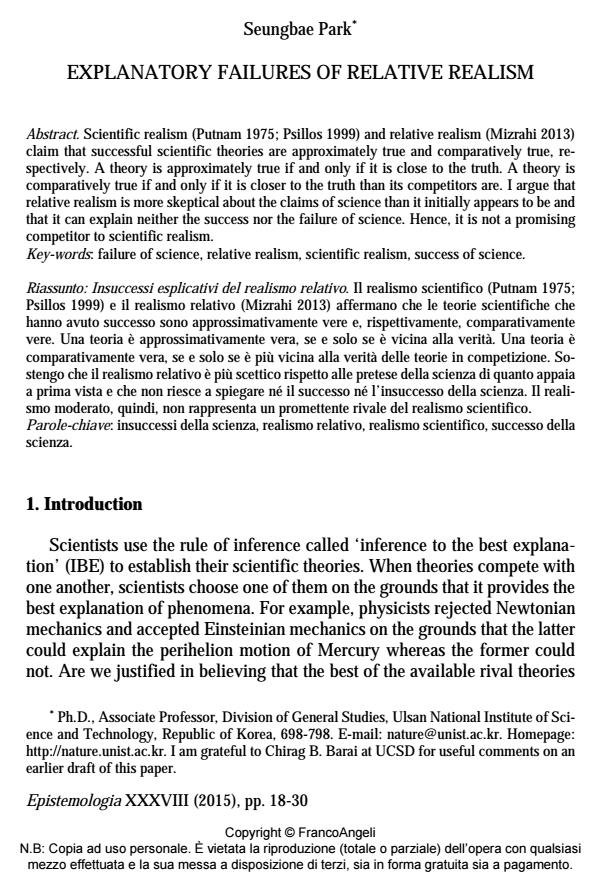Explanatory failures of relative realism
Journal title EPISTEMOLOGIA
Author/s Seungbae Park
Publishing Year 2015 Issue 2015/1
Language Italian Pages 13 P. 18-30 File size 61 KB
DOI 10.3280/EPIS2015-001002
DOI is like a bar code for intellectual property: to have more infomation
click here
Below, you can see the article first page
If you want to buy this article in PDF format, you can do it, following the instructions to buy download credits

FrancoAngeli is member of Publishers International Linking Association, Inc (PILA), a not-for-profit association which run the CrossRef service enabling links to and from online scholarly content.
Scientific realism (Putnam 1975; Psillos 1999) and relative realism (Mizrahi 2013) claim that successful scientific theories are approximately true and comparatively true, respectively. A theory is approximately true if and only if it is close to the truth. A theory is comparatively true if and only if it is closer to the truth than its competitors are. I argue that relative realism is more skeptical about the claims of science than it initially appears to be and that it can explain neither the success nor the failure of science. Hence, it is not a promising competitor to scientific realism.
Il realismo scientifico (Putnam 1975; Psillos 1999) e il realismo relativo (Mizrahi 2013) affermano che le teorie scientifiche che hanno avuto successo sono approssimativamente vere e, rispettivamente, comparativamente vere. Una teoria è approssimativamente vera, se e solo se è vicina alla verità. Una teoria è comparativamente vera, se e solo se è più vicina alla verità delle teorie in competizione. Sostengo che il realismo relativo è più scettico rispetto alle pretese della scienza di quanto appaia a prima vista e che non riesce a spiegare né il successo né l’insuccesso della scienza. Il realismo moderato, quindi, non rappresenta un promettente rivale del realismo scientifico.
Keywords: Failure of science, relative realism, scientific realism, success of science.
- Laudan L.(1981). A Confutation of Convergent Realism, Philosophy of Science, 48(1), pp. 19-49.
- Leplin J. (1987). Surrealism, Mind, 96(384), pp. 519-524.
- Lyons T. (2003). Explaining the Success of a Scientific Theory, Philosophy of Science, 70(5), pp. 891-901.
- Mizrahi M. (2012). Why the Ultimate Argument for Scientific Realism Ultimately Fails, Studies in History and Philosophy of Science Part A, 43(1), pp. 132-138.
- Mizrahi M. (2013). The Argument from Under Consideration and Relative Realism, International Studies in the Philosophy of Science, 27(4), pp. 393-407.
- Park S. (forthcoming). Realism Versus Surrealism, Foundations of Science.
- Park S. (2014a). On the Evolutionary Defense of Scientific Antirealism, Axiomathes, 24(2), pp. 263-273.
- Park S. (2014b). Approximate Truth vs. Empirical Adequacy, Epistemologia, 37(1), pp. 106-118.
- Psillos S. (1997). How Not to Defend Constructive Empiricism: A Rejoinder, The Philosophical Quarterly, 47(188), pp. 369-372.
- Psillos S. (1999). Scientific Realism: How Science Tracks Truth, New York, Routledge.
- Putnam H. (1975). Mathematics, Matter and Method, Volume 1, Cambridge, Cambridge University Press.
- Van Fraassen B. (1980). The Scientific Image, Oxford, Oxford University Press.
- Wray B. (2007). A Selectionist Explanation for the Success and Failures of Science, Erkenntnis, 67(1), pp. 81-89.
- Wray B. (2010). Selection and Predictive Success, Erkenntnis, 72(3), pp. 365-377.
- The Unificatory Power of Scientific Realism Seungbae Park, in Disputatio /2017 pp.59
DOI: 10.2478/disp-2017-0027
Seungbae Park, Explanatory failures of relative realism in "EPISTEMOLOGIA" 1/2015, pp 18-30, DOI: 10.3280/EPIS2015-001002